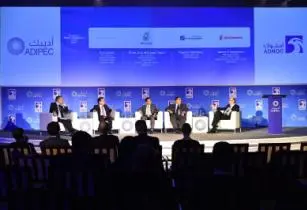Abu Dhabi International Petroleum Exhibition and Conference (ADIPEC) will be held from 12-15 November 2018, focusing on the advancement of artificial intelligence, blockchain, robotics, sensor technology, machine learning, deep learning, edge computing etc to drive oil and gas industry
Digitalisation is the number-one trend driving CEO decision-making in the global oil and gas sector. A range of interconnected emerging technologies aims to unlock a potential US$50bn in savings and increased profit, according to McKinsey. Digitalisation is expected to cut capital expenditure by 20 per cent, with operating costs in upstream cut three to five per cent and one to three per cent in downstream.
The related benefits to energy companies, their customers and the wider society, are even greater, estimated to reach US$1.6 trillion over the next seven years, according to data presented at the 2017 World Economic Forum Annual Meeting. Environmental benefits include reducing CO2-equivalent emissions by approximately 1,300mn tonnes, saving about 800mn gallons of water and avoiding oil spills equivalent to about 230,000 barrels of oil.
“Digitalisation is an urgent priority for industry CEOs and business leaders, offering cost savings, operational improvements, and safety and environmental gains that will reach into every corner of the business, but the opportunities come with risks that must be understood and navigated,” said Jean-Philippe Cossé, vice-president for Energy at dmg events.
“ADIPEC is responding to this with a new ‘Digitalisation in Energy zone, supporting innovation, and helping drive smart investments that will be the foundations of business success in the years ahead,” Cossé added.
Spanning both the exhibition halls and the strategic and technical conference programmes, the Digitalisation in Energy zone will include top technology providers and new start-ups serving the oil and gas sector. A purpose-built Innovation Theatre will provide tech companies with the opportunity to host expert talks and take digitalisation out of the technology silo and place it at the centre of a much bigger conversation.
Conference sessions for the downstream refining and petrochemicals sector, introduced for 2017, will return to ensure that ADIPEC covers each link in the oil and gas value chain. The co-located waterfront Offshore and Marine Exhibition and Conference will add a commercial dive zone, while other returning features include the ADIPEC Awards, which celebrate excellence in energy, and Young ADIPEC, a dedicated ‘edutainment’ programme designed to encourage students to choose a career in energy. New for 2018 will be an Inclusion and Diversity in Energy conference programme, continuing and expanding on the work of the Women in Energy conference in previous years.
Hosting more than 80 ministers, CEOs, and global oil and gas business leaders as speakers, ADIPEC brings together the companies, decision and policy makers that shape the future of oil and gas supply, for four days of focused business, dialogue and knowledge transfer that addresses today’s energy challenges and defines tomorrow’s hydrocarbon landscape.
The international technical and strategic conference spans 200 sessions, with 980 expert speakers and over 10,400 delegates. The technical conference programme, organised in collaboration with the Society of Petroleum Engineers (SPE), sets the international standard for the exchange of best-practice and operational excellence in the world of energy, with all technical abstract submissions put through a rigorous evaluation process by the Technical Programme Committee. Sessions cover upstream, midstream and downstream sectors, including specialised programmes such as offshore and marine.
Alongside the conference will be the landmark ADIPEC exhibition areas, underpinning the event’s status as a premier showcase for suppliers and customers across the oil and gas industry. For 2018, ADIPEC is expected to attract more than 2,200 exhibiting companies, including 38 NOCs and IOCs, and 30 international country pavilions.








